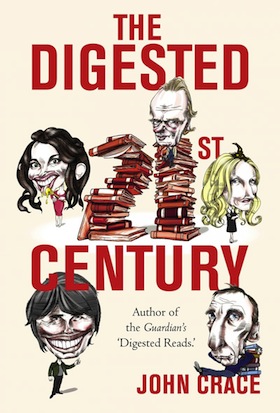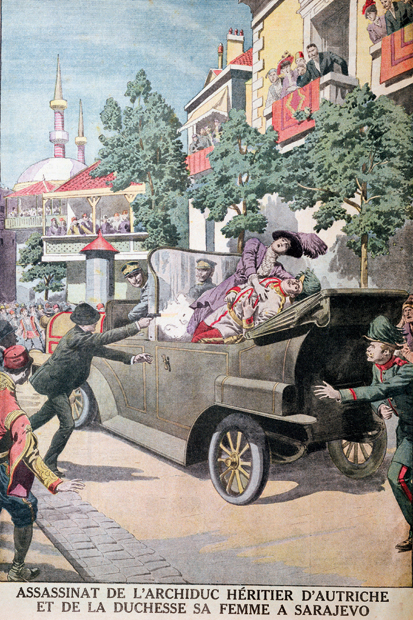Fiction
‘So how come we’re in the same book?’ Paul from The Stranger’s Child asked Florence from On Chesil Beach.
‘Apparently,’ replied Florence looking up from the introduction to The 21st Century Digested, ‘the parodies of new books that John Crace has been doing in the Guardian since 2000 are now so popular that 131 of them have been turned into a hardback collection.’
‘Impressive,’ murmured Paul. ‘But one thing worries me. Once even Crace’s fans see them all together, won’t they be forced to realise that he relies on the same handful of tricks for almost every novel he takes on?’
‘You mean, like simply having the characters point out what’s wrong with the book in their dialogue?’
‘That sort of thing.’
‘And what about the fact that Crace’s tone doesn’t vary much either? Personally, I like a short weekly blast of vitriol as much as the next caricature. Yet, given his apparent lack of affection for virtually any of these writers, mightn’t 329 pages of this stuff end up making him look merely mean-spirited, rather than thrillingly indifferent to received wisdom?’
‘I thought only one thing worried you.’
‘OK, so he throws in a few long words for Ian McEwan, and plenty of banalities for Dan Brown. But on the whole, he doesn’t pay enough attention to the language of the authors he’s targeting, preferring to make their plots seem arbitrary and improbable — something that’s never hard to do when you reduce a novel to 800 words.’
But in this, Paul and Florence weren’t being entirely fair. Crace’s parodies didn’t just rely on the characters telling us how rubbish their book is. Quite often a narrator came along to tell us how rubbish it is too — usually mentioning a big advance and the amount of padding that would be required to fill, say, 329 pages.
Non-fiction
John Crace had a problem. When it came to non-fiction, his parodies had also depended on a few tried and trusted methods — most of which, once again, consisted of rather baldly explaining their shortcomings. (And hadn’t he once read some literary advice along the lines of ‘Show, don’t tell’?) If the authors were in any way intellectual — Paul Auster, Frederic Raphael — their first-person voice would keep saying how clever they are and that they’re right about everything. If they weren’t — Paul McKenna, Paul Coelho — it would say how dumb they are and that their readers are all suckers.
Admittedly, he did have the advantage that he never needed to commit himself to anything. The 21st Century Digested, for example, could have successive pastiches of Christopher Hitchens’s God is Not Great, Karen Armstrong’s The Case for God and Alain de Botton’s fence-straddling Religion for Atheists — and dismiss them all as worthless. Such nihilism was, of course, a satirist’s prerogative; but in this case might it have the unfortunate effect of making Crace himself seem as if he’s saying how clever he is and that he’s right about everything?
And there was another paradox too. His starting point for almost all his non-fiction parodies was that anybody who publishes a book is ipso facto an egomaniac. Yet, not only was he about to publish this one, but he’d also added an introduction suggesting that his mission was to act as a one-man corrective to publishing hype.
Crace knew he’d scored some direct hits — and not all of them on such easy Guardian targets as Pippa Middleton and Jeremy Clarkson. He may even have been at his best when his disgust felt most real, as in his attack on Blake Morrison’s Things My Mother Told Me: ‘Obviously [my mother] would have hated the idea of this book; but that should not stop me, I thought. Would William Leith fail to exploit his family for a large cheque? Of course not. And am I not a man of equal sensitivity and depth?’
He also knew that he had a neat way with one-liners. (Gwyneth Paltrow’s advice on how to use her cookbook was ‘Get a member of staff to read it out loud while you are having a pedicure.’) But wouldn’t the fact that even his best moments were minor variations on a few endlessly recycled themes now become clear to even the most casual loo reader — to say nothing of the law of diminishing returns?
Perhaps, reflected Crace sadly, I should have left these pieces where they were. Then people might still have thought I was a fearless tilter at literary pretension in all its forms. Now they might just consider me a bit of a hack.
Got something to add? Join the discussion and comment below.
Get 10 issues for just $10
Subscribe to The Spectator Australia today for the next 10 magazine issues, plus full online access, for just $10.
Available from the Spectator Bookshop, £11.69. Tel: 08430 600033
You might disagree with half of it, but you’ll enjoy reading all of it. Try your first month for free, then just $2 a week for the remainder of your first year.













Comments
Don't miss out
Join the conversation with other Spectator Australia readers. Subscribe to leave a comment.
SUBSCRIBEAlready a subscriber? Log in